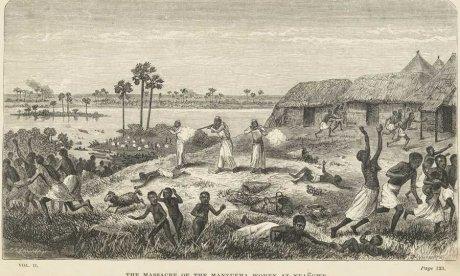The Lost Diary of David Livingstone

David Livingstone, by Frederick Havill, National Portrait Gallery, London
Wikimedia Commons

David Livingstone, by Frederick Havill, National Portrait Gallery, London
Wikimedia Commons
David Livingstone, the 19th-century Scottish explorer of Africa, Christian missionary, physician, and ardent abolitionist, lived a life of mythic proportions and left a legacy that continues to inspire scholarly research and public curiosity. During three separate journeys to Africa spanning more than 25 years, he generated what is arguably the richest, most extensive set of documentation to be found on the cultural and natural history of the continent in the pre-colonial era.
Some of Livingstone’s writings, particularly his account of a mass slaughter in the village of Nyangwe in the Congo, are credited with swaying public opinion in Great Britain and the United States against the enterprise of slavery, leading to the end of the African slave trade. The story of this event, and the efforts of scholars to uncover a fuller, more accurate portrait of Livingstone’s connection to it, is the subject of a documentary entitled Secrets of the Dead: The Lost Diary of Dr. Livingstone, premiering Wednesday, March 26 at 10 p.m. ET on PBS channels (be sure to check local listings for viewing dates/times).
NEH support from the Office of Digital Humanities, the Division of Preservation and Access, and the Division of Research Programs has enabled the scholarly discoveries at the center of this film. “The Lost Diary of Dr. Livingstone” chronicles the work of an international team of researchers and technical specialists, led by Professor Adrian Wisnicki of the University of Nebraska, to recover and interpret handwritten sources that have long been nearly impossible to read.
The Livingstone initiative is an excellent illustration of the ways that funding from various programs within NEH can support separate phases or components of a large-scale effort, thereby maximizing its impact and reach. The grant projects described below each play a complementary role in bringing this highly unique documentation to light and ensuring that it can be presented and understood in sufficient historical context:
- The Nyangwe Diary of David Livingstone: Restoring the Text (Office of Digital Humanities, HD-51042-10) – During this first phase, project director Adrian Wisnicki worked with a conservator at the Scottish Conservation Studio to prepare the delicate Livingstone diary to be photographed digitally. The diary pages were then sent to the National Library of Scotland where Wisnicki had assembled a team of imaging and data scientists under the direction of Michael Toth, who had previously worked on the Archimedes Palimpsest project at the Walters Art Museum. By photographing each page of the diary using a special spectral imaging camera, the team was able to successfully transcribe 99% of the diary's text.
- The Livingstone Online Enrichment and Access Project (Division of Preservation and Access, PW-51436-13) – This grant is supporting the digitization and transcription of a large corpus of Livingstone’s original writings, comprising some 3,500 manuscript pages, using advanced imaging methods developed through the above award. The materials include letters, journals, and diaries from each of Livingstone’s three African expeditions, held by the National Library of Scotland and the David Livingstone Centre, also in Scotland. This documentation covers a myriad of topics, not limited to 19th-century African history and the slave trade, including colonialism, religion, medical practice, Victorian literature, geography, cultural anthropology, and more. The digitized pages and transcriptions will be added to an enhanced version of the Livingstone Online website, hosted by the UCLA Digital Library Program, where they will be freely available worldwide.
- Explorer David Livingstone's 1870 Field Diary and Select 1871 Letters: A Multispectral Critical Edition(Division of Research Programs, RQ-50707-14) – With this third grant, the project team is creating an online critical edition of Livingstone’s 1870 Field Diary and a selected set of his letters from 1871, complete with annotations and explanatory essays. The annotations will help readers see how Livingstone’s friends edited the diaries after his death to tone down his criticism of British government policy and to dramatize his physical suffering. The essays will situate the diary and letters in the context of Livingstone’s life, the African societies among whom he composed the diary, and the broader historical circumstance of 19th- century exploration and imperialism.
In notifying NEH staff about the upcoming film, Professor Wisnicki, project director for all of the above grants, writes that “none of our work past and present would have been possible without the funding that you have so generously provided.” Further information on “Secrets of the Dead: The Lost Diary of Dr. Livingstone,” including a brief trailer, can be found at this PBS website.
